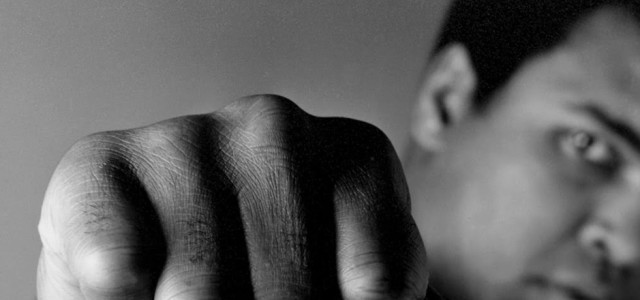
By Dahlia Lewis —
[dropcaps]W[/dropcaps]hen asked “How do you feel about different religions?” Ali replied: “Rivers, ponds, lakes and streams. They have different names, but all contain water. Religions have different names but all contain truth.”
As great as he was as one of the world’s most outstanding athletes in boxing history, Muhammad Ali was equally a force to be reckoned with in defending his Muslim faith and demanding racial equality. Sadly on the evening of June 3rd, the world’s greatest heavyweight boxing champion passed away at the age of 74. But more than just his scores and the opponents that he beat, Ali molded a reputation for himself outside the boxing ring that is outlandishly bold about his beliefs.
Ali (as Cassius Marcellus Clay Jr.) was born in Louisville, Kentucky on January 17, 1942. Reportedly, he grew a desire to learn boxing at the age of 12 after getting his bike stolen. He told a police officer that he wanted to beat up the thief, who then told him “well, you better learn how to fight before you start challenging people.” And the rest was history. With his superior speed and agility, Ali climbed his way up the ranks of professional boxers in the world, won numerous prestigious titles, and finally a gold medal at the Summer Olympics of 1960.
Now claiming the title of an American Hero, Ali shifted his energy from defeating his opponents to overturning racial and religious oppression. After a long spiritual journey, he made the decision to join the black Muslim group, Nation of Islam, in 1964. It was there that he met social activist Malcolm X, who would later become his mentor.
His new beliefs moved him to protest against the Vietnam War and refused conscription into the army. He remarked, “Why should they ask me to put on a uniform and go ten thousand miles from home and drop bombs and bullets on brown people in Vietnam while so-called Negro people in Louisville are treated like dogs and denied simple human rights?”
As a result, Ali was convicted of draft evasion and was almost stripped of his world title and boxing license. In the midst of the legal battle, he was forced to miss three prime years of his boxing career. Then in 1971, the US Supreme Court repealed the charges, in which Ali praised God for the turn of events. He later converted to mainstream Sunni Islam in 1975, and Sufi sect in 2005.
With all the global religious conflicts that have occurred recently, Ali has spoken against the backlash the Islam religion has received. Regarding the September 11 attacks, he stated, “Killing like that can never be justified. It’s unbelievable. I could never support hurting innocent men, women and children. Islam is a religion of peace. It does not promote terrorism or killing people.”
And most recently, he issued a full statement against presidential candidate Donald Trump’s proposed Muslim Ban, which has received praise from the leaders of The Council on American-Islamic Relations, the nation’s largest Muslim civil rights group. In one part of the statement, Ali wrote “Our political leaders should use their position to bring understanding about the religion of Islam and clarify that these misguided murderers [Islamic extremists responsible for terrorist attacks in Paris and San Bernardino] have perverted people’s views on what Islam really is.”
While Ali was hitting these political and religious conflicts with a powerful punch, he was battling Parkinson’s disease for 32 years, in which he unfortunately succumbed to. As the world mourns one of sporting history’s biggest loss, we are still left with fond memories and words of unshakable strength.


There’s been many great boxers in the world – Ali is among them but certainly doesn’t stand alone. The reason he stands out isn’t because of his skills, but because of what he was willing to give up. Ali fought for a leather belt, but what he’s calling for us to fight for today is the freedom of truth
One of the best athletes there ever was. Imagine how much more he can do for the Islam faith if he was still alive today